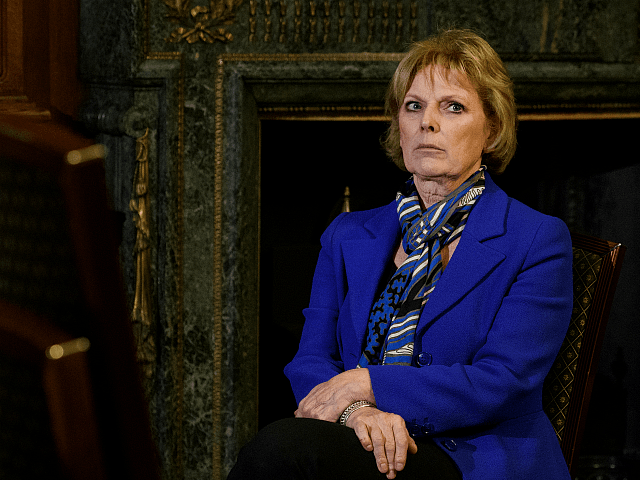The anti-Brexit party The Independent Group for Change, formerly Change UK (CUK), will be disbanded after winning no seats in the 2019 general election.
Party leader and former Conservative parliamentarian Anna Soubry made the announcement in an open letter to members on Thursday, confirming that the management council had “unanimously agreed to begin the process of closing down The Independent Group for Change”.
She added that the anti-Brexit party had been formed in February — from a rag-tag assortment of Labour and Tory Remainers — to respond to Britain’s “broken politics”, and claimed credit for the Labour Party swinging behind support for a second referendum, saying: “I do not doubt Labour shifted its position to a confirmatory second referendum because of the courageous move made by Chris, Mike, Ann, Joan, and others.”
(Of course, this ultimatelyended in disaster when Labour suffered its worst electoral defeat in eight decades, and the Brexit-backing Tories their best result since Margaret Thatcher’s last election.)
Ms Soubry then attacked her former party which she alleged had drifted “further to the nationalist right-wing” under Boris Johnson, and congratulated her dwindling team of cohorts for having “called out the dangers of the Conservative Party’s no-deal Brexit”.
If British politics had indeed been “broken”, they were mended through democratic processes when British voters decided in the December 12th snap election that Brexit must be delivered by returning Boris Johnson with an 80-seat majority, with not one of Soubry’s candidates winning a seat.
Soubry and her party’s two other MPs, Mike Gapes and Chris Leslie, all lost their seats to their former parties.
However, it was not just the soon-to-be-defunct party candidates who lost, but all those who had once belonged to it during its brief existence, several having jumped ship before the election.
Having the effect of the kiss of death on their political careers, the remaining eight either stood down or — standing as independents or Liberal Democrats — lost the race, even when they abandoned Leave-voting consitutents for Remain-voting ones in places likes London.
— Timeline of CUK: sound and fury, signifying nothing —
The party had its roots in defections from Labour and the Conservatives. In February, eight Labour MPs — Chuka Umunna, Ann Coffey, Luciana Berger, Mike Gakes, Chris Leslie, Gavin Shuker, Angela Smith, and Joan Ryan — quit over Jeremy Corbyn’s handling of antisemitism and Brexit. Three pro-Remain Tory MPs — Anna Soubry, Heidi Allen, and Sarah Woolaston — joined what was then known as The Independent Group later that month.
In March, the party rebranded itself as Change UK, or CUK. Calling themselves “centrists”, the vowed to fight local, European, and national elections to stop a clean-break Brexit and force a second referendum.
By April, CUK had registered itself with the Electoral Commission in time to fight the European Parliament elections, where the group hoped it would win a victory big enough to signal that Britons wanted a second referendum. Later, Allen, now party leader, introduced her European Parliament candidates who came from such diverse backgrounds as yoga instructor, former BBC presenter, and Boris Johnson’s sister Rachel.
In May the European Parliament did not provide CUK the resounding win it had hoped for, failing to get one single candidate into the EU Parliament. However, Anna Soubry claimed it was a victory for her party, saying that CUK had polled better than any other “new UK party” — ignoring the fact the Nigel Farage’s Brexit Party, which had been formed the same month as CUK, had come first in the election.
Things started to fall apart in June, when six CUK MPs abandoned the sinking ship — Woolaston, Allen, Umunna, Berger, Shuker, and Smith — with the majority, including CUK co-founder and de facto first leader Chuka Umunna, defecting to the Liberal Democrats.
— What’s in a name? —
Apparently, quite a lot for the gang of 11. Initially dubbed The Independent Group, or TIG, its name was changed to Change UK, though leader Heidi Allen at times still referred to the party as TIG, or the “Remain Alliance”, and to her colleagues as “TIGgers”.
(“CUKs” or “CUKers” was presumably considered somewhat less than desirable branding.)
The name came under dispute in the summer, however, with online petition website Change.org threatening legal challenge for copying their name. The group petitioned the Electoral Commission in June to change the name and rebranded as… The Independent Group For Change.
It was not just the name that caused a branding headache for TIG, CUK, The Independent Group For Change, however.
In April, the Electoral Commission rejected TIG’s logo — a black square with “TIG” and “#Change” in white — for being “mislead[ing]”. The electoral watchdog also said that the initials were not “sufficiently well known” for Britons to know who they were voting for.
In the following month’s European Parliament election, a blank square appeared beside candidates’ names.

COMMENTS
Please let us know if you're having issues with commenting.